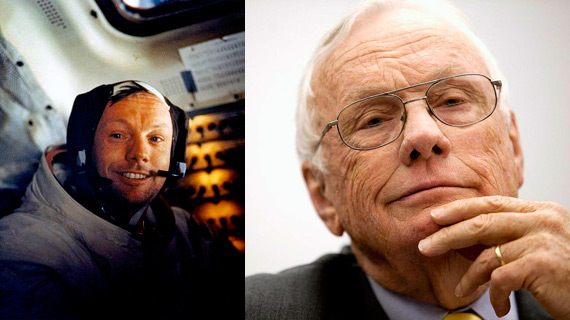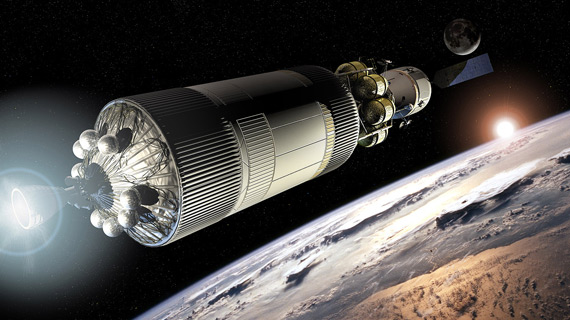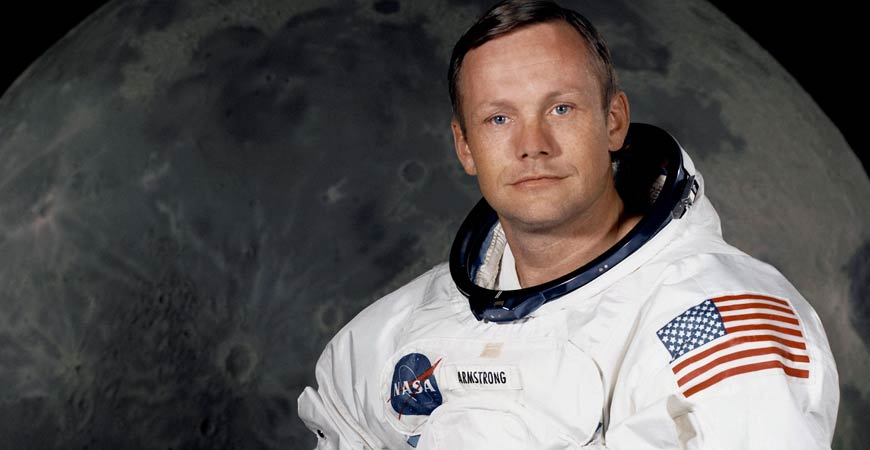(This article was originally published on August 29, 2012)
I find myself quite saddened by the death of Neil Armstrong.
My remorse is not simply due to the loss of a highly–intelligent and humble man who, along with Lunar Module Pilot Buzz Aldrin, accomplished what was perhaps the greatest feat in human history. It’s more about his unfulfilled legacy and the lack of a collective will to drive human destiny forward into the stars.
The practical aspects of Neil Armstrong’s journey to the Moon began in the dreams of science-fiction authors like Jules Verne, and began coming to fruition with the work of rocket scientists such as Robert Goddard and Wernher Von Braun.
Ultimately, it took the vision of President John F. Kennedy to put our nation on the final decade–long course to our neighbor in the sky. Some believe it was politics alone — the Cold War conflict with the Soviet Union — that was the sole motivation of the Apollo Moon program.
While a sense of national pride helped to drive the actions of the nearly 500,000 individuals who made Armstrong’s lunar landing possible, I believe there was something much more afoot.
In much the same way that ancient people stood on the shore of an ocean and pondered what lay across the waters (if there were another side), how many countless individuals throughout human history have stared up at the Moon and wondered what it would be like to go there and set foot on its surface?
It was the stuff of dreams. However, thanks to inspiration, ingenuity, and a lot of money, Neil Armstrong and eleven other men know the answer.

The stupendous leaps that allowed us to go from the first powered flight of just 120 feet at Kitty Hawk in 1903 to crossing the 230,000 mile gulf between the Earth and the Moon less than seventy years later were a remarkable and unprecedented continuum of human achievement.
Think of the exponential explosion of speed and technology required! Never before or since has our species accomplished so much in so little time. That said, who possibly would have imagined that we would basically choose to immobilize ourselves in 1972 and never return to the Moon or travel beyond to other amazing destinations like Mars or the moons of Jupiter.
In actuality, no one has traveled beyond low Earth orbit, roughly 300 miles, in nearly forty years. Again, given the amazing feats that lead to Neil’s landing on the Moon, stopping seemed unthinkable — especially to the people who were engaged and aware of the complexity and bravado required to achieve it.
Some say that America getting there before the Soviets was really the goal and that once it was attained, there was no real point in continuing. I find this concept appalling and ultimately irresponsible when viewed through the lens of what’s required for the long-term success of our species.
I won’t spend time here illuminating all of the positive and innovative changes in our society that were wrought by the Apollo missions. Suffice to say that the very computer that I type this on would not exist. The iPhone that I received calls on while writing this would not exist. Many of the materials in the car that I drove and the appliances I used today would not exist.
I dare say that, without Apollo, we would have remained in a technological dark ages. But, honestly, my interest in seeing humans return to, live upon, and ultimately travel beyond the Moon has very little to do with technology. It has to do with our very survival.
Many astronauts describe the experience of traveling beyond the atmosphere and looking back at the world as a virtually religious experience. They describe a fragile orb hanging in the blackness of space with its tenuous oceans and atmosphere. A place without clearly discernible signs of human activity — save the lights of cities on the night side.
They most certainly could not see the constant turmoil of our politics and wars. They could not see the borders of countries, nor the separations we ourselves have created with regard to religion, race, gender, and ethnicity.
The experience of space travel gave these astronauts a true sense of our reality. The REAL reality that exists extends far beyond the bounds of the seemingly surface upon which we plod out our daily grind. We are not separate from the universe. We are part of something much greater.
Space exploration has given us views of our own world and allows us to see it anew. It allows us to witness an ecosphere that is becoming severely stressed by the activities of our own species. I believe that it is from this orbital vantage point that we might find real solutions to all sorts of social and environmental ills.
However, sadly — due to our myopic view of the world — we’ve moved away from the challenge of exploration and turned inward. A vast number of young people today know very little about our journeys to the Moon. In fact, quite a few that I’ve encountered during my work in education believe that the whole thing was faked. (Thank you Fox TV for that ridiculous Moon Hoax special a few years back!)
I find deep fault with an educational system that has not done its job with regard to illuminating the importance and achievements of space exploration. As far as I am concerned, it should be required reading throughout elementary school and beyond. Imagine the inspiration that children could feel from knowing about and witnessing this amazing legacy.
It was no secret that Neil Armstrong was a quiet man. He did not seek fame and power. He was a pilot, an engineer, and a consummate professional who always faced each challenge to the best of his ability. NASA chose him to land on the Moon because they knew he had the skills and the keen mind to get the job done. While many astronauts waxed philosophically about their adventure, Neil went on his way into a thoughtful retirement.
However, in his final years, Neil re-entered the public spotlight. He, like many of the remaining Apollo astronauts and engineers, was deeply concerned by the Obama Adminstration’s cancellation of the Constellation Program. It was a project that would have returned America to the Moon and established the foundation for permanent colonization.

It was set to meet many of its initial goals in the coming years, including new launch systems, crew capsules, landers, and rovers. The hardware was being designed and constructed. A new field of astronauts were in training. Yet, due to politics, Constellation was scrapped.
I was initially not a big fan of Constellation due to its limitations and expense, but came to see the program as the only real game in town for getting us back in the lunar business. With China, Russia, India, and other countries setting their sights on the Moon, we’re about to be left in the dust.
I give it decade of less before another nation makes footprints in the regolith. And this time it will be for the long term. Not just a quick jaunt. These other nations see the Moon for its real potential as a source of energy and a staging area for other more ambitious adventures. China wants to place a permanent colony there by 2030. This is really happening.
Neil’s concern was that — after all that he and hundreds of thousands worked to accomplish — Americans simply wouldn’t be there for the party. He felt that an aggressive and significant approach to human spaceflight was needed to get America off its laurels. While recent robotic triumphs like Curiosity and Cassini mean a lot, I believe that they’re preaching to the converted.
The real way to get the common man interested again is to get some people up there. Not just on an expensive and limited space station, but truly out there exploring neighboring planets and paving the way back to the future. With this visceral inspiration, there is no question in my mind that millions of kids would grow up wanting to become astronauts, scientists, and engineers as opposed to rappers, actors, and sports players.
A rich and vigorous human exploration of space would spur quantum leaps in economic development and perhaps change and advance our culture in ways we can’t even imagine. That is a society of tomorrow is worth fighting for. I believe Neil Armstrong understood and took up that fight in the end.
It truly saddens me that he had to die knowing that — not only had no other men set foot on the Moon for forty years — but there are not even remote plans to do so in the future.
What will become of a species that cannot see beyond itself? It is my sincerest hope that the legacy of Neil Armstrong will continue onward sooner than later. The survival of the human race may depend on it.
Images: EcaStrip, PalmBeachPost, and NASA
